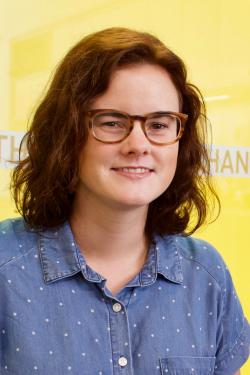Erin Turbitt is a lecturer and social scientist at the Graduate School of Health. We speak to Erin to learn more about her research into human genetics and molecular pathology, and her role at GSH.
For the past three years, Erin Turbitt (@erin_turbitt) has been working in Bethesda in the United States, alongside world leaders in genomics and genetic counselling research and teaching in a postdoctoral fellowship at the National Human Genome Research Institute.
Erin has joined the Graduate School of Health’s Genetic Counselling teaching team, where she will coordinate the medical genetics and genomics subjects and continue with her research.
Erin’s journey

Erin studied a Bachelor of Biomedical Science and majored in Human Genetics and Molecular Pathology from Victoria University of Wellington, New Zealand, and completed her PhD in Human Genetics and Social Science at the University of Melbourne.
Her research explores the psychological and behavioural aspects of translating genomics and how families affected by genetic disorders cope and make decisions about healthcare and involvement in clinical trials.
We spoke to Erin to learn more about her journey into genetic counselling.
Tell us more about your background and how you got into Genetic Counselling?
I’ve always been fascinated by health and the human body. When I started learning more about genetics in undergrad, I became interested in how our DNA and genes are responsible for so many differences and similarities we see in nature, including ourselves.
Following undergrad, I worked for three years in molecular biology laboratories. While I still found the science behind what we were doing interesting, I knew that working in a laboratory was not for me. During this time, we were starting to use a lot of new genomic technologies; as laboratory scientists, we were having a lot of trouble interpreting the genetic results. I wondered “if scientists are struggling with this, how are patients managing?”.
This question led me to start a PhD studying exactly that, at the Murdoch Children’s Research Institute in Melbourne. Genetic Counsellors are a crucial part of this work, and my research has many implications for the field.
Why are you passionate about Genetic Counselling?
Genomics is revolutionising healthcare. I’m passionate about helping make sure that society _patients, families and clinicians - benefit from this transformation as much as possible. The light bulb moment for me was when I realised that having a career as a scientist didn’t necessarily mean working in a laboratory.
The light bulb moment for me was when I realised that having a career as a scientist didn’t necessarily mean working in a laboratory.
What do you hope to achieve with your research?
My work explores the decisional process when parents consider enrolling their child with an inherited neurodevelopmental condition in a clinical drug trial. This research will contribute to developing decisional support tools for parents and individuals making these decisions.
In addition to the ethical advantages of better-quality decisions, decision support interventions improve participation and reduce drop-out rates; thus boosting paediatric-specific drug data and ultimately improving child health and safety.
Why UTS?
I’m excited to be part of a brand-new course and have the opportunity to develop and build a program to support the education of the future workforce that will be at the centre of genomic healthcare. My choice was further influenced by the opportunity to work with great people, both at UTS and across Australia.
What advice do you have for Genetic Counselling students?
Seize as many opportunities as you can and adopt a growth mindset. If something seems scary or intimidating, acknowledge your weaknesses and trust in your ability to learn, from both your successes and your mistakes. Build strong, positive relationships with your fellow students, they will be an invaluable source of support.
Learn more about Genetic Counselling at the Graduate School of Health.

